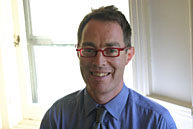Kasirer Dean of Law
The Board of Governors has confirmed Nicholas Kasirer as the new Dean for the Faculty of Law for a five-year term. Kasirer, a James McGill Professor and director of the Quebec Research Centre of Private and Comparative Law, has been at McGill since 1989.

Dean of Law Nicholas Kasirer
Owen Egan
Kasirer is replacing Peter Leuprecht, who resigned last spring. He has big ambitions for his faculty. Not, he cautions, in the sense of "empire building" and hiring hundreds of new professors, but on a more fundamental level of what law, and the teaching of law, is all about.
With its integrated bilingual Common and Civil Law programme and a large graduate student component, McGill already occupies a unique place among law schools in North America, if not the world. Kasirer wants to take that multifaceted approach and run with it.
"It has to do with a way of imagining law that's very special, that goes to the nature of the discipline. The potential for what we're doing here is so innovative, so different, that it has to be spoken of in these enthusiastic, and yet scholarly, terms because it is a scholarly project as much as a professional one," he said.
"The best way is to start thinking of law not as a territorial phenomenon -- something that's Quebec law or Canadian law or North American law -- but of law as a series of intellectual traditions."
Kasirer envisions this process as a kind of dialogue in which scholars and practitioners in different fields of law can use the various traditions to become more than lawyers, but also thinkers. He likens it to multiculturalism.
"One of the ways to sustain diversity is to allow each of the separate communities to pursue their own ambitions, and flourish on the basis of tolerance or pluralism, without necessarily engaging one another.
"Another way to look at it is in an encounter with someone who is not like you, you enrich yourself. In that spirit of contact there is an educational project. In law it becomes less about identifying the applicable legal rule for a given place, but more about understanding the legal idea as it's measured against how the same problem would be looked at elsewhere," he said.
In effect, Kasirer said that he would like to see law thought of as something closer to a classical liberal arts education rather than professional training.
"You can imagine McGill graduates saying, 'Wait a minute, I'm a practicing lawyer in Vancouver or Montreal or Paris, and what is this guy talking about? He sounds like he's saying law is no longer a professionalist concern.' I think the best answer to that is McGill has always thought of law in this way. It's always been the place where you don't learn the rules, but where you go to learn to think about the law and to imagine what it can be," he said.
Kasirer points out that McGill has a number of "constituents," not all of whom are lawyers. With its two-system approach, the school is oriented simultaneously to Quebec, Canada, North America, and Europe. In this mission, Kasirer is a good choice for the deanship. In addition to a BCL and LLB from McGill, he received a DEA from the Sorbonne, where he has also taught as a visiting professor.
As dean, Kasirer hopes to make the faculty a place where scholars and support staff can realize their ambitions. He also intends to bring the school more fully into the life of the campus.
"I expect the law faculty to be more closely bound up with the university than it is now, not just up on the hill in its corner worrying just about its professionalist pre-occupations, but engaged in scholarship as well as governance."
The success of the faculty is tied to the university, but so are its challenges. Like the rest of the Canadian university system, McGill's Faculty of Law is facing a cash crunch. Kasirer sees the new provincial government's promise to start consulting on funding in the new year as a chance to convince Quebec City to commit to "investment, not expenditure." He also wants to clearly state that contrary to rumour, privatizing the faculty is not on his agenda.
"The Faculty of Law last year went through some thinking of options, and I don't think privatizing was ever given a serious thought. Frankly, just from the point of raw numbers, we'd lose our government funding and would have to change so much it would be prohibitive to study law at this university."
At 43, Kasirer is relatively young to hold such a senior position. What are his plans for after the deanship?
"To put no too fine a point on it, my hope is that at the end of five years, the Law Faculty will be such an exciting place to work that it's the only place I'd want to work. That's how I feel about it now."
